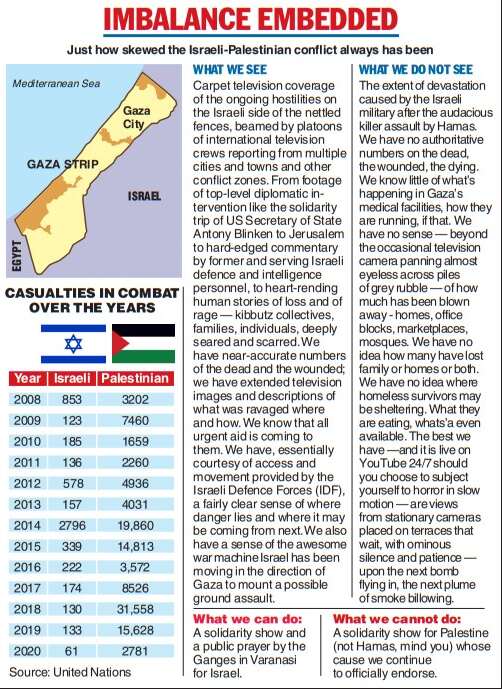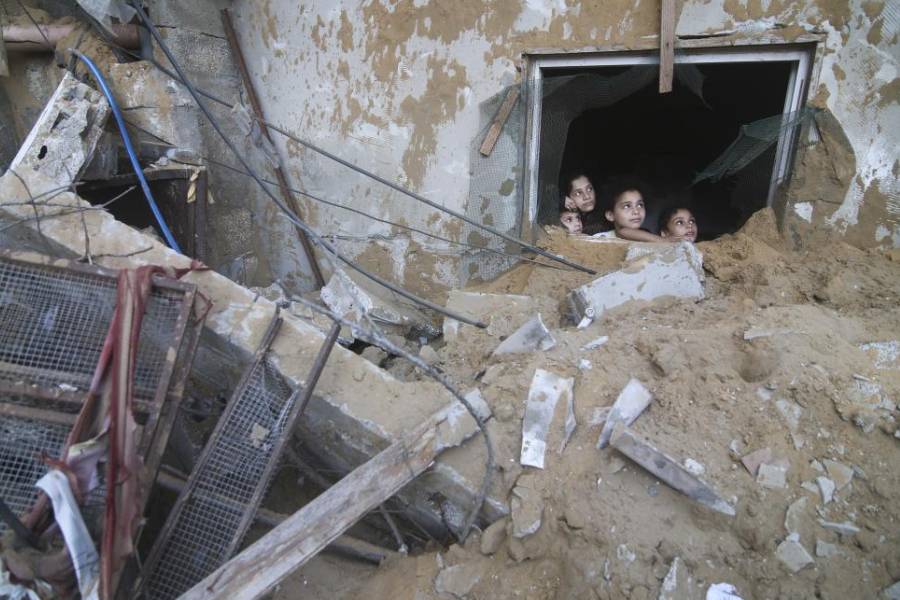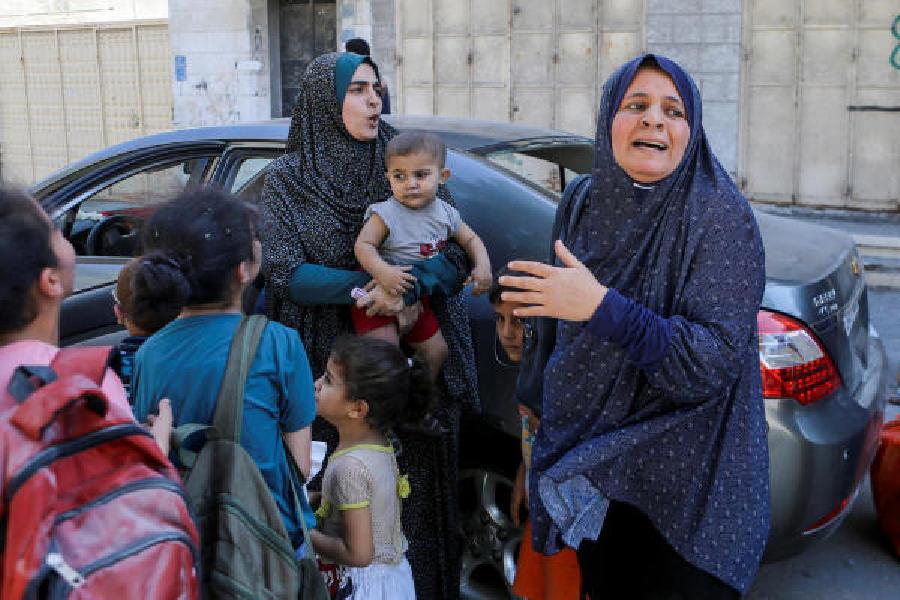Medics in Gaza warned on Sunday that thousands could die as hospitals packed with wounded people ran desperately low on fuel and basic supplies.
Palestinians in the besieged coastal enclave struggled to find food, water and safety ahead of an expected Israeli ground offensive in the war sparked by Hamas's deadly attack.
Israeli forces, supported by a growing deployment of US warships in the region, positioned themselves along Gaza's border and drilled for what Israel said would be a broad campaign to dismantle the militant group.
A week of blistering airstrikes has demolished entire neighbourhoods but failed to stem militant rocket fire into Israel.
The Gaza health ministry said 2,329 Palestinians had been killed since the fighting erupted, more than in the 2014 Gaza war that lasted over six weeks.
That makes this the deadliest of the five Gaza wars for both sides. More than 1,300 Israelis have been killed, the vast majority of them civilians killed in Hamas's October 7 assault.
An estimated 150 others, including children, were captured by Hamas and taken into Gaza. This is the deadliest war for Israel since the 1973 conflict with Egypt and Syria.
The US state department said secretary of state Antony Blinken would return to Israel on Monday after completing a frantic six-country tour through Arab nations aimed at preventing the fighting from igniting a broader regional conflict.
Hospitals in Gaza are expected to run out of generator fuel within two days, endangering the lives of thousands of patients, according to the UN. Gaza's sole power plant shut down for lack of fuel after Israel completely sealed off the 40km-long territory following the Hamas attack.
In Nasser Hospital, in the southern town of Khan Younis, intensive care rooms are packed with wounded patients, most of them children under the age of 3.
Hundreds of people with severe blast injuries have come to the hospital, where fuel is expected to run out by Monday, said Dr Mohammed Qandeel, a consultant at the critical care complex.
There are 35 patients in the ICU who require ventilators and another 60 on dialysis. If fuel runs out, “it means the whole health system will be shut down”, he said, as children moaned in pain in the background.
“All these patients are in danger of death if the electricity is cut off."
Dr Hussam Abu Safiya, the head of paediatrics at the Kamal Adwan Hospital in northern Gaza, said it did not evacuate despite Israeli orders. There are seven newborns in the ICU hooked up to ventilators, he said.

“We cannot evacuate, that would mean death for them and other patients under our care.”
Patients keep arriving with severed limbs, severe burns and other life-threatening injuries. “It's frightening," he said.
Shifa hospital in Gaza City, the territory’s largest, said it would bury 100 bodies in a mass grave as an emergency measure after its morgue overflowed, with relatives unable to bury their loved ones.
Tens of thousands of people seeking safety have gathered in the hospital compound.
Gaza was already in a humanitarian crisis because of a growing shortage of water and medical supplies caused by the Israeli siege.
With some bakeries closing, residents said they were unable to buy bread. Israel has also cut off water, forcing many to rely on brackish wells.
Israel has ordered more than 1 million Palestinians — almost half the territory’s population — to move south.
The military says it is trying to clear away civilians ahead of a major campaign against Hamas in the north, where it says the militants have extensive networks of tunnels, bunkers and rocket launchers.
Hamas urged people to stay in their homes, and the Israeli military released photos it said showed a Hamas roadblock preventing traffic from moving south.
The UN and aid groups say the mass exodus within Gaza, along with Israel’s complete siege, will cause untold human suffering.
The World Health Organisation said the evacuation “could be tantamount to a death sentence” for the more than 2,000 patients in northern hospitals.
About 500,000 people, nearly one-quarter of Gaza’s population, were taking refuge in United Nations schools and other facilities across the territory, where water supplies were dwindling, said Juliette Touma, spokesperson for the UN’s refugee agency. “Gaza is running dry,” she said.
The military said on Sunday that it would not target a specific route south for several hours, again urging Palestinians to leave the north en masse.
The military offered two corridors and a longer window the day before. It says hundreds of thousands have already fled south.
The UN agency for Palestinian refugees says an estimated 1 million people have been displaced in Gaza in a single week.
The US has been trying to broker a deal to reopen Egypt’s Rafah crossing with Gaza to allow Americans and other foreigners to leave and humanitarian aid amassed on the Egyptian side to be brought in.
The crossing, which was closed because of airstrikes early in the war, has yet to reopen.
Israel has said the siege will only be lifted when the captives are returned.
Hundreds of relatives of those captured by Hamas gathered outside the Israeli defence ministry in Tel Aviv late on Saturday, demanding their release.
“This is my cry out to the world: Please help bring my family, my wife and three kids,” said Avihai Brodtz of Kfar Azza. Many expressed anger at the government, saying they still have no information about their loved ones.
Hamas rocket attacks on Israel continued on Sunday, spurring a broader evacuation from the southern Israeli city of Sderot.
The city of about 34,000 people sits about a mile (1.6km) from Gaza and has been a frequent rocket target.












